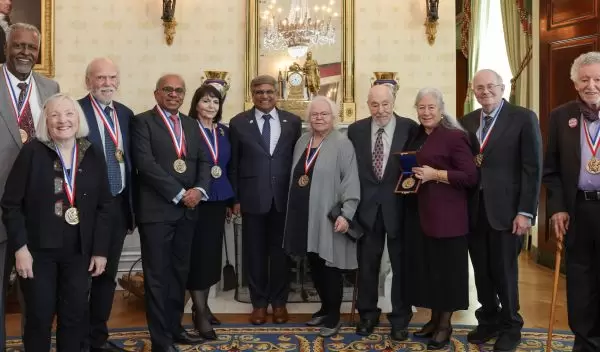
NSF congratulates the National Medal of Science and National Medal of Technology and Innovation recipients
Today, President Joe Biden announced the latest recipients of the National Medal of Science and National Medal of Technology and Innovation — the nation's highest honors for achievement and leadership in advancing the fields of science, technology and innovation. The awardees received their medals at a ceremony held at the White House.
"Congratulations to all the National Medal of Science and National Medal of Technology and Innovation laureates. Their groundbreaking achievements exemplify the spirit of American innovation and underscore the United States' position as a global leader in science, technology and innovation," said U.S. National Science Foundation Director Sethuraman Panchanathan. "NSF takes immense pride in having supported many of the medal recipients recognized today. Their remarkable accomplishments — from producing the first direct detection of gravitational waves emitted by a binary black hole merger to pioneering cell-based immunotherapies for cancer — highlight the profound impact of NSF’s investments in curiosity-driven and use-inspired research. NSF remains committed to investing in the scientists, engineers, inventors and students that will lead to the next generation of key innovations that unravel mysteries, solve pressing problems, and drive our nation's economic and national security."
Established by Congress in 1959 and facilitated by NSF on behalf of the White House, the National Medal of Science is bestowed by the president of the United States to honor individuals deserving of special recognition for their outstanding contributions in biology; computer sciences; education sciences; engineering; geosciences; mathematical and physical sciences; and social, behavioral and economic sciences, in service to the nation. With the addition of today's laureates, 520 Americans have received the award. Nominations for the medal are received by the research community and reviewed by the President's Committee on the National Medal of Science, who make the recommendations to the president for final selection.
Created by Congress in 1980, the National Medal of Technology and Innovation is administered by the U.S. Department of Commerce’s Patent and Trademark Office on behalf of the White House. The award recognizes those who have made lasting contributions to America's competitiveness and quality of life and helped strengthen the nation's technological workforce. A distinguished independent committee representing the private and public sectors submits recommendations to the secretary of commerce, who in turn makes recommendations to the president, who makes the final selection. To date, more than 220 individuals have received this prestigious honor.
Among the recipients, NSF has funded, at some point in their careers, seven of the nine recipients of the National Medal of Science and six of the 12 recipients of the National Medal of Technology and Innovation.
The recipients are:
National Medal of Science
-
Huda Akil, University of Michigan.
-
Barry Barish, Caltech.
-
Gebisa Ejeta, Purdue University.
-
Eve Marder, Brandeis University.
-
Gregory A. Petsko, Harvard Medical School, Brigham and Women's Hospital.
-
Myriam Sarachik, (posthumously) The City College of New York.
-
Subra Suresh, Massachusetts Institute of Technology, Brown University.
-
Shelley Taylor, UCLA.
-
Sheldon Weinbaum, The City College of New York.
National Medal of Technology and Innovation
-
Mary-Dell Chilton, Syngenta Biotechnology Inc.
-
John M. Cioffi, Stanford University, ASSIA Inc.
-
Rory A. Cooper, University of Pittsburgh, U.S. Department of Veterans Affairs.
-
Ashok Gadgil, University of California, Berkeley, Lawrence Berkeley National Laboratory.
-
Juan E. Gilbert, University of Florida.
-
Charles W. Hull, 3D Systems.
-
Jeong H. Kim, Kiswe Mobile Inc.
-
Steven A. Rosenberg, National Cancer Institute.
-
Neil Gilbert Siegel, University of Southern California.
-
(Team) James Fujimoto and Eric Swanson, Massachusetts Institute of Technology, and David Huang, Oregon Health & Science University.
